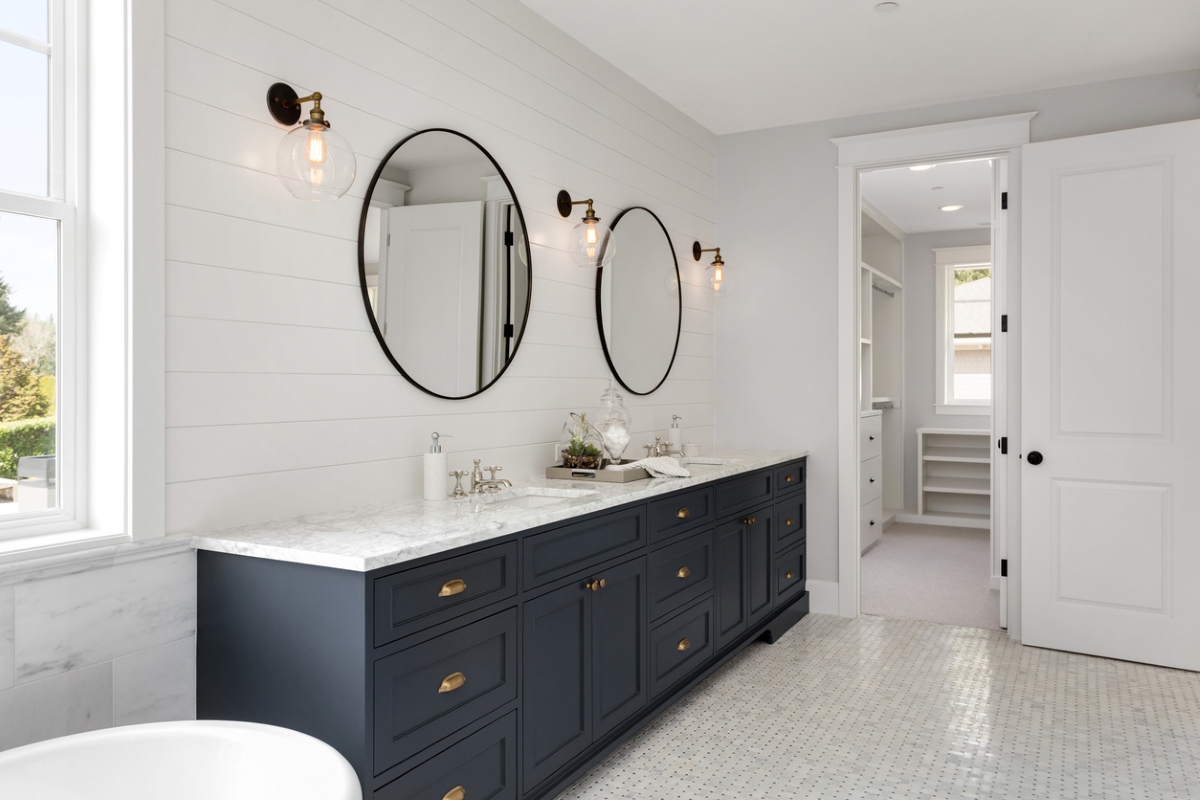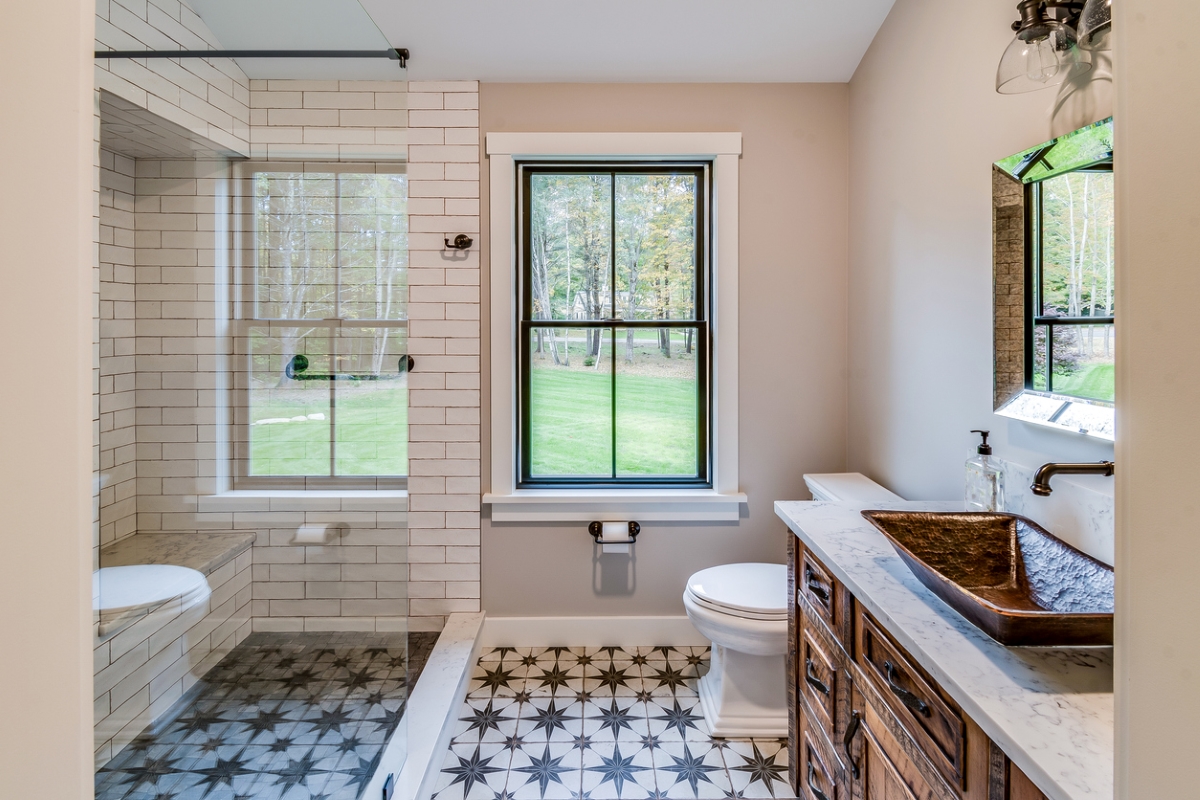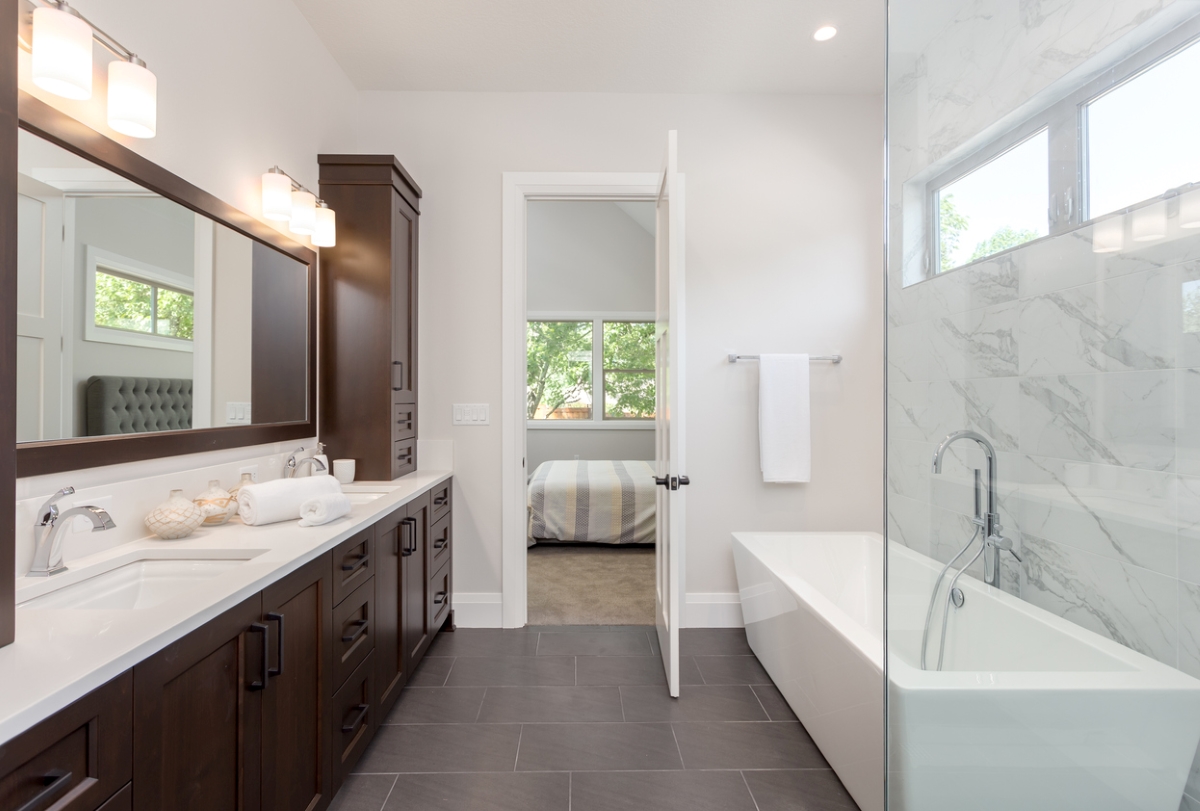We may earn revenue from the products available on this page and participate in affiliate programs. Learn More ›
Q: I’m shopping for a new home and keep seeing the term “en suite” in house listings. What does en suite mean?
A: When real estate agents use the French phrase “en suite” in real estate listings, they are referring specifically to a bathroom with a private entrance inside a bedroom (meaning the bathroom isn’t accessible to the wider house via a hallway). Most en suite bathrooms attach to a primary bedroom, creating what we commonly refer to as a primary suite. Some larger homes may have an en suite bathroom in more than one bedroom.
An en suite is a room connected to another room.
Translating “en suite” to English isn’t cut and dry. The French word “ensuite” translates to “then” or “later” in English and has nothing to do with real estate. But that fact hasn’t stopped the British from using the word “ensuite” to describe a hotel room with its own private bathroom. If you’re renting a room in England and you don’t want to share a bathroom with strangers, then you better make sure it has an ensuite bath.
The French use “en suite” to describe any two rooms put together to form a single living space. That use of the phrase isn’t quite the same in the United States, where we use the word “suite” to refer to any hotel accommodations that have more than one room and “en suite” to refer specifically to rooms with an attached private bathroom.
In real estate, the term generally refers to en suite bathrooms.
When you see “en suite” in real estate listings, it’s referring specifically to private bathrooms attached to the primary, or owners’ bedroom. We often associate this layout with a primary suite, which is a common feature in newer homes and even modern apartment buildings. Since the bathroom isn’t accessible from the main part of the home, it is en suite. Don’t confuse an en suite bathroom with a Jack and Jill bathroom, which is a bathroom with doors that lead to two separate bedrooms.
We tend to associate French words used in the English language with something fancy, (which is likely why the real estate industry loves to use it in listings), and that holds true with “en suite.” In addition to being private, many en suite bathrooms are roomier than other baths and include luxuries not typically found in a standard full bathroom, including jacuzzi tubs, double sinks, walk-in closets, and large walk-in showers. Some en suite bathrooms even have water closets for an extra layer of privacy.
RELATED: No More “Master Bedrooms”? Real Estate Agents’ Terminology is Changing with the Times

An en suite bathroom has several benefits, like privacy and convenience.
An ensuite bathroom offers privacy and convenience. For families, an en suite bedroom means not having to share the bathroom with the kids. With their location in the inner sanctum of a primary bedroom, one can use the toilet or shower in peace without worrying about impatient family members knocking on the door.
Since most en suite bathrooms include double sinks and large mirrors, there’s no need to wait your turn to brush your teeth or wash your face.
With an en suite bath, a middle-of-the-night trip to the bathroom doesn’t require a long journey down a dark hallway. You also won’t have to dart from bathroom to hall to bedroom following a shower. In fact, many en suite bathrooms conveniently integrate a walk-in closet.
En suite bathrooms also often offer more cabinet space for storing toiletries than a regular full-sized bathroom. And, since the bathroom is private, there’s no need to tidy up for guests and other family members or hide away items you don’t want on display.
Tucked away from the hustle and bustle of the main parts of the home, an en suite bathroom creates a private oasis for a relaxing bath or allows for a moment of quiet reflection while using the toilet.
En suite bathrooms can have drawbacks.
While most en suite bathrooms may add convenience, privacy, and a bit of luxury, in some cases they can make things awkward when guests visit. If an en suite bathroom is the only bathroom in your home, then guests will have to walk through your bedroom to use it. You’ll also have to maintain a tidy bathroom and store personal items you may not want guests to see, such as prescription medicines and certain lotions and creams.
Furthermore, some couples may not like the close proximity of the bathroom to the bedroom. An early riser going through their morning routine might create too much noise for a partner who likes to sleep in.

An en suite bathroom can potentially add to a home’s resale value.
Once considered a luxury, en suite bathrooms are now common in most modern homes and apartments. As such, many buyers expect a home to have this amenity. If your home has the space, adding an en suite bathroom can be a worthwhile investment. Homeowners can expect to recoup about 54 percent of the project cost at resale.
Keep in mind, however, that an en suite bathroom can detract from a home’s value if it is the only bathroom in a home. No one wants guests traipsing through their bedroom to reach the only bathroom in the house. With that in mind, an en suite bathroom really only makes sense if there is at least one additional half bathroom in the home.
RELATED: Here’s How to Get the Best Bang for Your Buck With a Bathroom Remodel
Final Thoughts
The term “en suite” can mean different things depending on what country you’re in and whether you use the term as two separate words or as a single word. That said, when you see the phrase in a real estate listing, trust that en suite bathroom means a bedroom that includes a private bathroom.
En suite bathrooms offer convenience and privacy and with more floor space and luxury bath fixtures, are often more lavish than a standard full bathroom. These features make them a sought-after feature by home buyers. Know that you’ll get a good return on the addition of an en suite bathroom to your home (as long as you have at least one other bathroom for guests).


